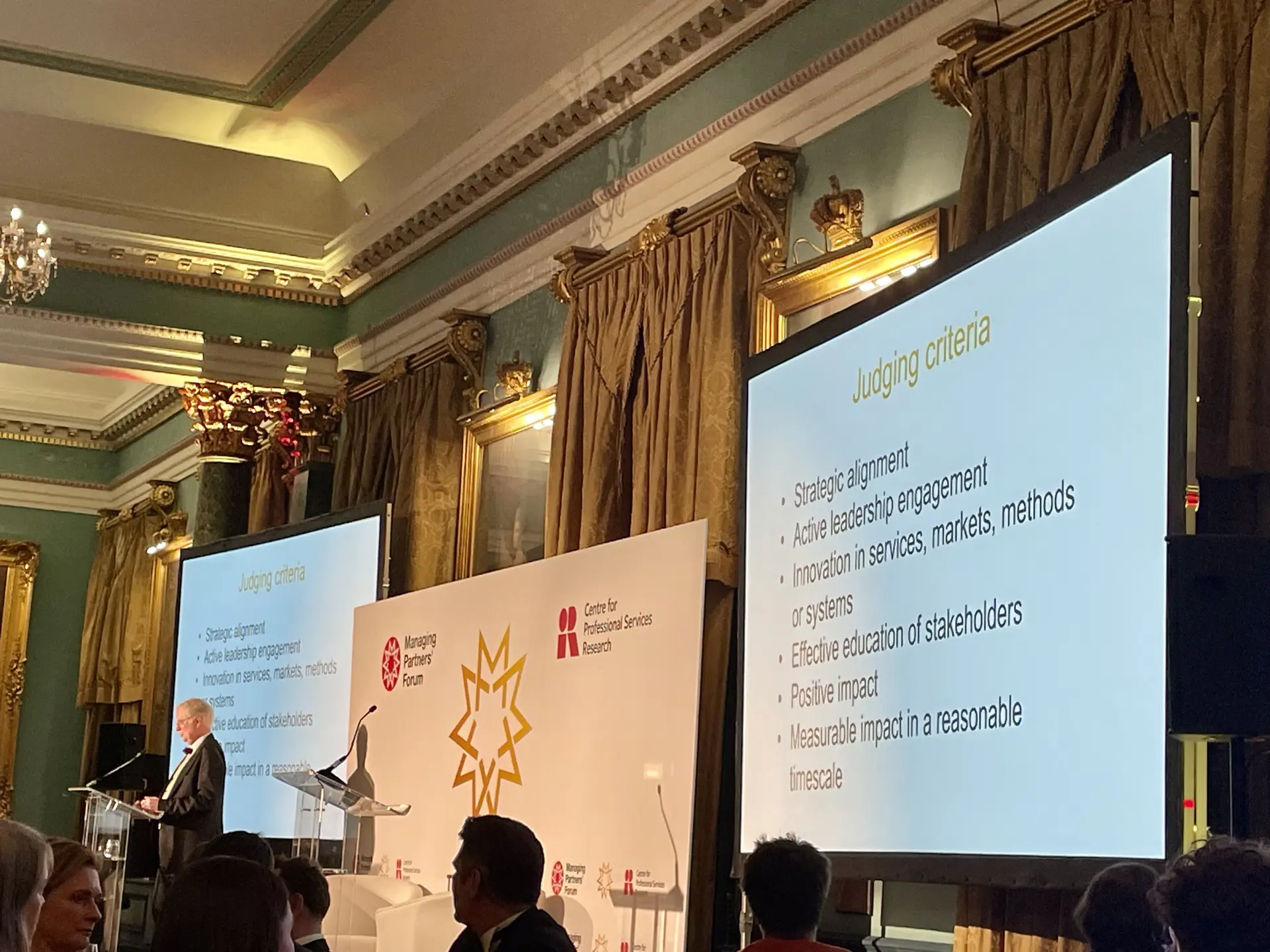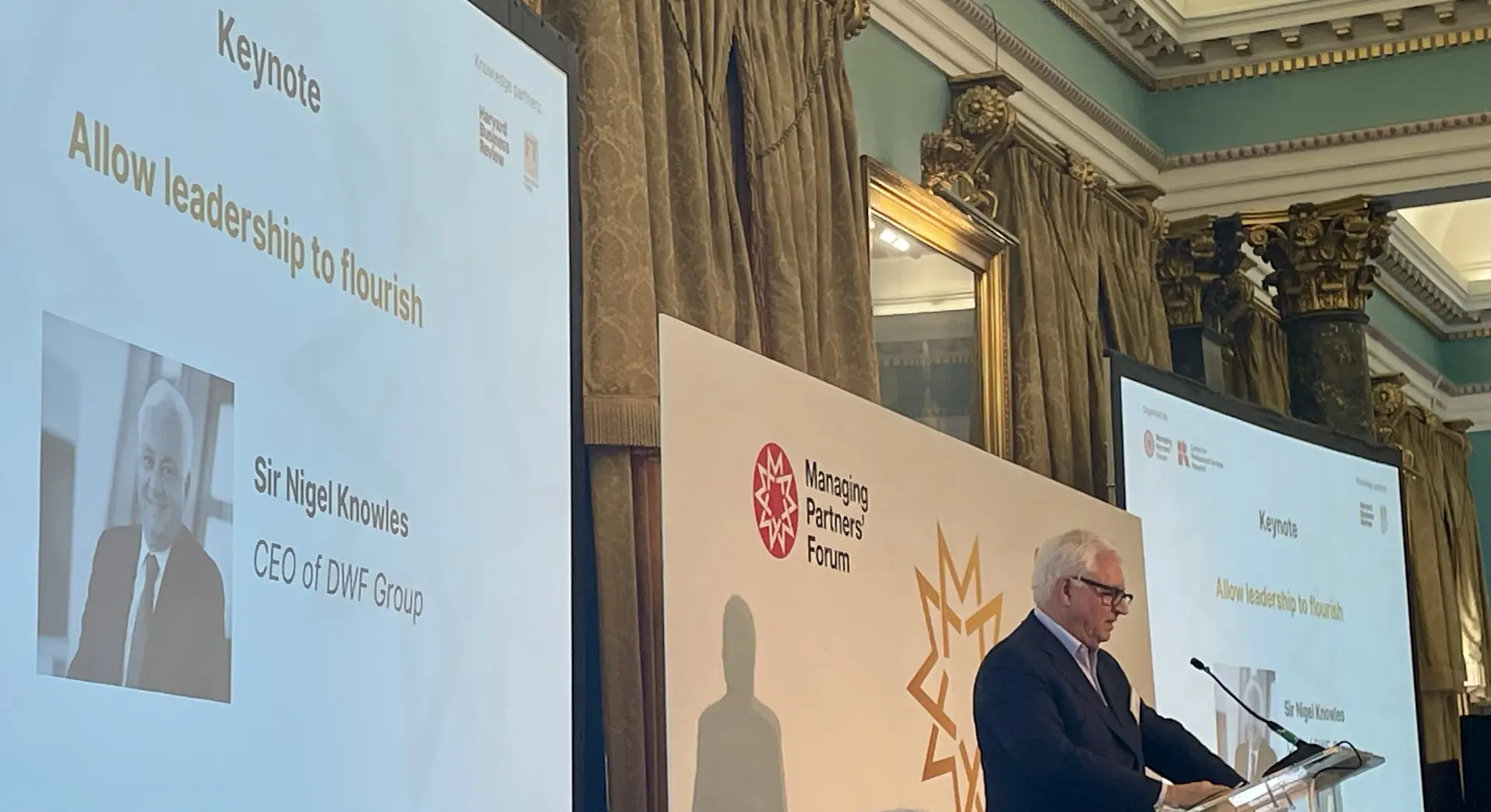Professional services leadership excellence: lessons in believability from the 2025 Managing Partners’ Forum Growth Summit

Bringing together senior leaders and their trusted advisors on 28 March 2025, the first Managing Partners’ Forum Professional Services Growth Summit was held at the Institute of Directors in London’s Pall Mall, and followed the Professional Services Management Excellence Awards the previous night.
True exercises in defining and showcasing believability in professional services. Both gatherings celebrated and shared lessons from successful leadership in professional services. Each event provided senior-level networking from across the industry and a wealth of useful tips, tools and talking points from experienced speakers, knowledgeable guests, insightful workshops and content.
The power of professional thought leadership to increase believability and drive growth
I was delighted to be a judge for the Excellence in Thought Leadership category at this inaugural awards ceremony. I found the shortlisted entries to be of a very high standard in demonstrating how thought leadership drives growth and social action. Trowers & Hamlins won the award for Thought Leadership Excellence and the worthy runners up were Crowe U.K. The winners had the edge over the competition for demonstrating how they continue to drive action and contribute to culture, community and engage their target industries through their thought leadership activity, which was carefully aligned across commercial and communications objectives, strategic leadership and focus.
The discussions on the day about why winners were awarded in their respective categories leads to a key question: what does good look like now when it comes to thought leadership? In a professional services context, true thought leadership sets firms apart from the competition and drives meaningful action. Rather than purely creating content, thought leadership programmes should be viewed as strategic activity that works towards positive and sustainable change, business growth, furthering conversations with under-represented groups, contributing to related industries or business communities, and offering both informed opinion and action points.
Differentiation can be achieved through considering under-served or seldom explored topics. It could even take the form of presenting well-worn subject matter in a fresh light, adding new perspectives to an ongoing industry discussion. Either way, genuine thought leadership presents solutions to pressing issues or challenges, or opens up new opportunities in crowded markets.
Over the past couple of decades, thought leadership was viewed as an exercise in broadcasting and putting out to market opinion pieces and commentary – sometimes building research-led content – but often confused with content marketing or considered purely a public relations activity. Thought leadership content and associated research were created as a hygiene factor: part of running and promoting a professional services firm when “we need to have a voice on these issues” or “we need to be seen to comment on x, y, z”.
Forward-thinking firms would use thought leadership as a strategic business development tool – providing insights and recommendations for specific target markets and following up from a sales perspective, also using subject matter expertise and insights for marketing and PR purposes. Yet, all too often, target audiences have been bombarded with vast amounts of content (of varying credibility and quality), saturating the market. This crucial commercial opportunity has been overlooked in the race to launch the latest thinking to market.
Now, thought leadership has evolved as a discipline to take carefully researched, data and fact-based content and commentary forward into meaningful conversations, curated content and well-crafted campaigns that reinforce a firm’s position as leaders and independent thinkers – but not just stopping there. Thought leadership now needs to take this thinking to the next level, encouraging further debate, driving engagement and action, and making clear recommendations of what to do in response, once armed with the appropriate knowledge and insights. It also needs to be aligned and closely connected to the firm’s strategy, vision, mission and values to ensure authenticity, differentiation and cut-through.
Thought leadership is an opportunity to create a storytelling ecosystem that embodies what your firm represents – supporting the brand, wider stakeholder engagement such as policymakers and industry sectors, and furthering commercial endeavours.
Thought leadership is a crucial piece of the puzzle when it comes to building believability. The J+P framework, the Building Blocks of Belief, demonstrates how firms can move from making their business more understandable, to building credibility, then inspiring emotion, which then leads to engagement, action and, ultimately, belief – in the firm’s capabilities, what it stands for and how it is looking to the future. This drives both investability and growth, cementing the organisation as a true leader and a thought leader.
Building a communications ecosystem, viewing through internal, external, communications and commercial lenses, was discussed at length later in the day of the Growth Summit, where we participated in a collaboration workshop on the importance of research in professional leadership moderated by Clive Webb, Head of Business Management, ACCA, and Stephen Mayson, Honorary Professor, Faculty of Laws, University College London.

Understanding and addressing the current marketplace as a firm foundation for strategy, operations and communications
John Ferguson of The Economist Intelligence Unit set the scene by discussing the implications and scope of the current three-pronged “perfect storm” of geopolitical uncertainty, climate change and the impact of AI. He spoke of the need to address the multiple risks they represent – now and in the future – through careful monitoring and looking inwards to the culture of the organisation to ensure alignment of strategy and purpose.
Additional challenges – and challengers!
I would add two more forks of lightning from the current storm to the unique marketplace in which professional services firms find themselves: consolidation and M&A activity growing, particularly in the UK; and the rise of challenger firms, such as Veles Consulting (founded by ex-KPMG and EY partners) and the private equity-backed Unity Advisory, launched by former EY and PwC executives in April 2025. Other boutique consultancy challengers launched this year too, such as Affinia and Steppingstone.
While ‘The Big Four’ do not appear too concerned about challengers taking their market share, ripple effects have been noted and there are certainly opportunities to embrace in specialist areas and markets, reinforced by comments in a recent Sunday Times articles such as “A partner at one of the professional services giants conceded that smaller boutique firms posed a threat in specific markets”.
Brand Finance has picked up on the growing brand value of challengers and their ability to reshape the industry as the sector stagnates overall and some major firms have seen a drop in brand value in the past year.
Like financial services (Revolut and Monzo, for example, have seen significant growth in their businesses and brand value throughout 2024. Revolut is regularly in the media as they consider their listing options) and the energy sector (see Octopus Energy, ranked 144 in the UK Top 250 brands, and Utilities Warehouse, at 238), disrupters are making noticeable waves in the professional services industry.
The UK landscape
The Growth Summit was held in the wake of the controversial UK Spring Statement, and John Rowland of H/Advisors Cicero bookended John Ferguson’s opening talk with an overview of the turbulence on the UK political and economic scene.
When you add the impact of AI into the challenger mix, a new marketplace starts to emerge. We are likely to see a significant shift in the way professional services firms operate and set themselves up for success while holding fast against these multiple headwinds.
Leadership lessons
“Hire for diversity in all things apart from values.”
Sir Nigel Knowles, CEO, DWF Group
Well-known industry leader and veteran, Sir Nigel Knowles, CEO of DWF Group, who also built DLA Piper, provided an honest and insightful keynote, sharing his key lessons on leadership:
-
Be open to innovation: ultimate success = willingness to innovate and change. Room to innovate leads to growth opportunities. Be willing and prepared to diversify and evolve. Sir Nigel shared examples of buying non-legal companies to reflect the evolving marketplace.
-
Stay curious: find whitespace and opportunities, and stay on top of what’s happening in the market. Try to anticipate what may be coming and then use that to pivot accordingly.
-
Ensure effective governance: it’s essential that leadership is aligned, including a successful governance model to enable this, and with leaders that can effect change. Your people act as agents for change. Sir Nigel was clear that a great COO is essential to the success of the CEO and organisation overall so that successful execution sits seamlessly alongside the strategic leader. The COO is also critical in any transformation journey: “Many transformations fail because they can’t get out of strategy into execution.”
Joining up the dots between brand, business model and communications
Sir Nigel spoke about several leadership and marketing models that have stood the test of time, which he, after having learned them at Harvard Business School, has drawn on to manage change and lead successful professional services firms and networks. He cited the McKinsey 7-S Model, focusing on Strategy, Structure, Systems, Staff, Skills, Style and Shared Values, and emphasised the importance of monitoring progress against this.
Using tried and tested management models in practice is something we return to consistently at Jones + Palmer, joining up the dots between brand, business model, strategy and storytelling. Our recent work shows how brand, business model clarity and purpose-led storytelling are increasingly interdependent. Where innovation meets identity, the stories that firms can tell and how they tell them become strategic assets that influence valuation, culture and capital allocation. Strategic stories, authentically told, build businesses and cement an organisation’s positioning, identity and credibility – to the extent that they can move markets, open doors to new work and increase both engagement and investment appetite across different stakeholder groups.
Communication, persistence and passion
When it comes to shared values, beliefs need to be embedded in the organisation. Clear and transparent communication is vital to build belief and ensure alignment. Trust, belief and passion are all key ingredients in the most successful organisations.
Public vs private for professional services
“We’ve had headwinds ever since the global financial crisis.”
It was fascinating to hear Sir Nigel’s experience of going public in 2019 with DWF, followed by the firm’s move to return to being a private company in the face of another unique, three-pronged lightning bolt – first Brexit, then the Covid-19 pandemic, then the war in Ukraine.
“There is nothing else, as a firm, that will benefit the entire business – when you look at cost per head, brand focus suddenly becomes very good value.”
Matt Allen, Bidwells
Ruxandra Radulescu talked about the relationship between brand and behavioural science, emphasising how an organisation’s brand is a strategic asset: “If people don’t fully believe in what you stand for, client perceptions and experiences can be warped”. She discussed how brand is identity, what you stand for, and is therefore tied up with emotion. This can be a very powerful differentiator – “one of the biggest advantages we can have”. She also demonstrated how, when you trust a brand, you are more likely to buy it/buy into it and pay a premium for it, even on a subconscious level, and shared examples of what happens when brands lose trust from a strategic and commercial perspective.
This was followed by a panel session chaired by Ruxandra, discussing case studies of investing in professional services brands and successful campaigns that have boosted the bottom line. Matt Allen, Director of Business Development and Marketing at property consultancy Bidwells, talked about connecting thought leadership, growth strategy, and the firm’s brand to build lasting relationships and increase penetration in target markets, citing the award-winning thought leadership campaign centred around universities that now accounts for a third of the firm’s business.
Lee Grunnell, Chief Marketing Officer at law firm Womble Bond Dickinson, discussed how they assess progress as part of their quarterly key performance indicator (KPI) strategy and conduct detailed brand tracking research, with all indicators pointing to a significant uplift from the previous year. They found clear patterns between increasing website traffic and business coming through the door – the trends point to a new digital discovery process. This also emphasises the importance of bringing on and offline communications and digital touchpoints together into a cohesive narrative and consistent strategic focus. This moves the thought leadership content created and curated beyond a content strategy to a series of sustained, integrated campaigns. These campaigns in turn work internally to de-silo organisations, and bring teams and departments together. This makes it far easier to present a believable and credible brand externally through every expression.
The importance of brand in corporate growth is coming to the forefront across industries in turbulent times. Cision’s recent 2025 Communications Report emphasises CEO’s expectations of communications and marketing leaders in connecting brand, reputation, revenue and growth. The study found that nearly half of communications leaders (47%) say CEOs expect them to build sustainable growth and value for the brand, with 45% of CEOs expecting them to respond to changing marketplace dynamics and opportunities, and 42% to be accountable for driving revenue.
The panel discussed the opportunities that investing in your organisation's brand offers for differentiation and increasing pricing to more premium levels to reflect quality and recognition. The onus is on fewer, higher-quality outcomes – geared around answering the question of what the firm wants to be famous for. This is where thought leadership comes into its own.
Matt explained how the focus of their thought leadership project was on the community locally initially, specifically not talking about property or the firm’s services, but was centred on how to bring together members of the business community in the region and build relationships. The programme led to a series of events tailored to target audiences, media outreach and significant media coverage, which propelled action internally with leadership and with the high-profile prospects invited to participate in the thought leadership content and events. This gathered momentum locally and across the UK, developing into gaining Government funding and building a partnership of some 60 universities.
Brand and client relationships
In professional services firms, marketing, communications and business development teams are often closely linked or work as part of the same department. This unity can be a source of competitive advantage when strategic goals are aligned and implementation is both cohesive and consistent. The outcomes are closer, more informed client relationships and, ultimately, retaining and winning more work from clients that trust in the brand and the business advisors with whom they have a meaningful relationship.
Marketing and business development leaders as trusted advisors
Many key themes discussed were woven around the role of marketing and business development leaders in professional services as trusted advisors to managing partners and the C-Suite. A key aspect of this is in knowing, understanding and anticipating the client base. Alastair Beddow of Meridian West ran a workshop on the growing importance of client listening and formalised programmes to collect insights and act on them with the right investment and resources, diversifying and adapting where necessary. A proactive approach is needed to stand out from competitors that offer similar services, especially when economic pressures mean tighter budgets. Their recent research showed that around 55% of firms have a co-ordinated approach to client listening to reflect the client experience becoming more intentional. He raised a word of caution, however, in ensuring sufficient capacity and resources are dedicated to looking after and listening to clients. Successful client relationships often depend on just a few individuals.
He also cited evidence that investment in marketing and business development in the professional services sector outstrips inflation, with customer experience (traditionally seen as less of a priority than in retail and consumer sectors) becoming a core focus area. Firms are refocusing around greater efficiency and profitability, and client care is core to both. Alastair’s take, based on their research, is that there are a number of pro-growth factors at play for professional services in the current marketplace, despite clients tightening their belts. New funding models for the industry are also leading to additional investment opportunities – echoing the experiences shared by Sir Nigel Knowles.
Facing the future with connected communication and collaboration
Alongside technology automation and acceleration, the industry is seeing a significant shift. Whether the challenges we face in the professional services sector are challenger brands and new entrants, the ongoing issue of recruiting and retaining talent and clients, the need to explore ways to diversify and differentiate services and products in an increasingly crowded market, or unearthing new opportunities outside the usual remit – cohesive and intentional research, communication and collaboration are going to be key to tackling what comes our way. The leading firms of the future will harness these areas of expertise and strategic thinking. Marketing, communications and business development leaders are well positioned to steer the course on this journey and see it through to success.



